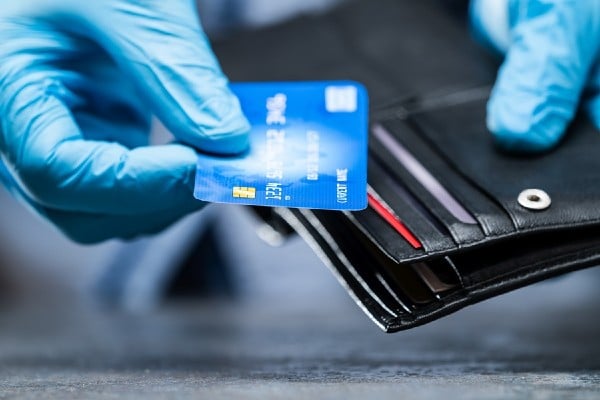If the coronavirus outbreak has affected your income – through a COVID-19 layoff or reduced work hours – paying your credit card debt and other bills may be a struggle.
Most Americans have housing payments (either a mortgage or rent), plus obligations like car notes, student loans, insurance and utilities too.
But for many people, those credit cards are a lifeline. In fact, you might be using plastic more often during the coronavirus pandemic just to get by — perhaps to buy groceries or pay for costs that you can charge without affecting your immediate cash flow.
Problems can occur, however, when the balances on those credit card bills keep creeping up month after month. Before you know it, even making minimum payments on your credit card debt becomes a challenge.
Fortunately, there is some relief available if you need help managing your consumer debts.
Below is some advice from an expert with a unique perspective on the topic.
Working With Credit Card Firms and Lenders Amid the Coronavirus Crisis
Quyen Truong is a partner at Stroock & Stroock & Lavan in Washington, D.C., where she represents businesses, lenders and other financial institutions.
She’s also a former Assistant Director of the Consumer Financial Protection Bureau – so Truong has experience tackling the topic of consumer debt from both sides of the issue.

Truong offers 3 tips to anyone having trouble keeping up with credit card payments and other debts:
1- Communicate to know your options
“Reach out to your bank and lenders if you have issues, and be alert to their communications too in this turmoil,” says Truong.
“Ignoring communications will only worsen problems on both sides,” she adds, explaining that banks and lenders may spot frauds against you, and also may tell you how they’re doing things differently, from closing branches to offering help under new programs.
2- Be explicit in your requests
“If you’ve suffered hardship from the coronavirus, then tell your bank and lenders so clearly, fully explain your situation and what relief you need,” Truong advises.
“They can’t accommodate every request, but your explanation – and even the basic act of asking for help – may make you eligible for some available benefit or relief under their programs of which you otherwise wouldn’t even know,” Truong says.
3- Use online resources for speed
When most of us have an issue that we need to tackle with a creditor, we usually pick up the phone to handle the situation. But Truong says that’s not the best strategy in the current environment when so many people need assistance.
Instead of spending hours dialing your creditors by telephone, she recommends using the web as much as possible to initiate and process your requests.
“Change is hard but, with long call times these days as banks and lenders are inundated with callers, you’ll get faster and better information and assistance by using their digital channels and mobile apps versus calling,” Truong says.
Additionally, the “Frequently Asked Questions listed on their websites often can provide immediate answers to your questions or give you a head-start on requesting assistance,” Truong notes.
To give you another headstart – a jumpstart in implementing Truong’s advice – read on to get specific contact information for various lenders, and to discover the steps these companies are taking to ease the stress of credit card debt during the COVID-19 emergency.
Read: How I Paid Off My Credit Card Debt
Deferments and Payment Plans
Those financially impacted by coronavirus can take comfort in knowing that most credit card issuers are offering fee waivers, deferred loan payment options, reduced interest rates, and other forms of economic relief to consumers in need.
A few companies offer blanket assistance for all customers. But with most financial institutions, each customer’s financial need is evaluated on an individual basis, and it is up to the credit card issuer to decide if a customer is eligible for assistance.
Here are some of the specific relief services being offered by several big companies:
-
- American Express – Interest waiver, late payment fee waiver, the lowering of monthly payments, and interest. For more information visit: https://www.americanexpress.com/us/customer-service/financial-hardship.html or call: 1 (800) 528-4800
-
- Apple Card – Allowing all cardholders to skip March payments without penalty. For more information visit: https://support.apple.com/apple-card or call 877-255-5923
-
- Bank of America – Payment deferrals for credit cards, mortgages, and auto loans, and waived overdraft fees. For more information visit: https://about.bankofamerica.com/promo/assistance/latest-updates-from-bank-of-america-coronavirus or call 800-732-9194
-
- CitiBank – Credit line increases, collection forbearance, potential pause on minimum payments, and fee waivers. For more information visit: https://online.citi.com/US/JRS/pands/detail.do?ID=covid19 or call: 1-800-950-5114
-
- Chase Bank – Fee waivers, payment extensions, credit line increases, and assistance with travel arrangement cancellations made through Chase. For more information visit: https://www.chase.com/digital/resources/coronavirus?jp_aid_a=51899&jp_aid_p=chasehome_3/trip3 or call: 1-800-935-9935
-
- Capital One – Fee suppression, minimum payment assistance, a pause in loan payments. For more information visit: https://www.capitalone.com/coronavirus/ or call: 1-800-227-4825
-
- Discover – Payment delays, fee waivers, late payment assistance, and interest waivers. For more information visit: https://www.discover.com/coronavirus/ or call: 1-800-497-2816
Again, to receive any assistance or waivers, you have to personally contact your bank or credit card company and explain how COVID-19 has impacted your current finances. They will determine if they can provide relief on a case-by-case basis.
Even if you aren’t sure whether you qualify, if you have been financially affected by the COVID-19 outbreak in any way, you should get online or give your lender a call.
Certainly, those who have experienced a coronavirus-related job loss, work furlough company shutdown or business slowdown should reach out to explore their options.
It’s best to seek help now – rather than wait until a small, perhaps modest financial problem becomes a much larger crisis.










